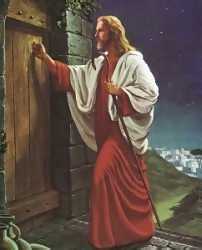Joy! I have a little trouble every time I hear that word. It's more than just a word for me. My mom's mom, the grandmother who died suddenly in the car accident that I talked briefly about
a couple days ago, was named Joy. Of course I didn't call her that when she was alive, she was grandma to me. But since her death, I've seen and heard her name many, many times. And now, I cannot hear that word without thinking about her.
 |
| Yup, that's the stereotype. |
Unfortunately, I cannot share a picture of her with you because she tended to run away whenever she saw a camera. And besides, she died long before digital photography became common place. I can try to paint a picture with words. Imagine the stereotypical Sicilian grandmother: short, stocky with dark eyes and dark curly hair. Always cheerful and a very good cook. Every year we had a cake walk at my school and she'd always bake a couple Barbie cakes (like
this). I always made a point to win one. She babysitted me all the time. I remember playing at her house. I remember her helping me over the fence in the backyard so I could visit my friend who lived in the house behind hers. One of my last memories of her was of her crocheting in the front room of their house in the Ozarks (the house they moved to only a year or two before her death. They had previously lived near my family in Kansas City, MO).
After death, her influence on me got so much greater. I may never know what impact she had on me while she was alive because she spent my formative years with me. But I do remember and appreciate her impact on me since her death.
One of the most concrete ways that her death itself impacted me is that it still, to this day, affects how I deal with people who are mourning. When she died, I saw at least three very different ways of mourning. 1) My mother completely lost control instantaneously when we got the phone call. I remember my mom wailing and I went to her room to find out what happened. Between sobs, I got the whole story.
2) Then it was my turn to mourn. I didn't shed a tear or acknowledge any sadness for a couple of years. While my mom is the kind of person to express themselves dramatically on the spot, I'm the kind of person to stew over it for a while. I guess I was in shock for a while and then I got busy with other things. I guess I may have also had a sense of needing to stay strong for everyone else. I was in middle school before I started seeing a counselor regularly. (She died when I was in third grade.) And this is not simply the response of a young child. Only 7 years ago, a close friend of mine died and I didn't start mourning him until months later. So, when I walk into a hospital or hospice room, I have a lot of sympathy for the aloof family member who doesn't shed a tear and I often find myself wanting to defend such people against the other family members who are accusing them of not caring.
 |
| My mom is "On Time." I'm "Delayed." And I think by grandfather was basically "Cancelled." |
3) My grandfather, her husband, ran away from everything. It wasn't instantaneous, but in the two or three years after her death he gradually abandoned the family that they had raised together. He sold all of her belongings without giving the kids a chance to pick anything up first. He burned all of his bridges to his old life with my grandmother. Unfortunately, I don't have much sympathy for people who react this way. I can sympathize with the family who is victimized by such people. I say victimized because when one person dies and another person disappears, you essentially lose two members of your family at the same time.
Shortly before September 11th, 2001, I had a dream with Joy in it. She told me some things that at the time didn't make any sense. After the terrorist attack, however, it dawned on me that she had been telling me about that. She had been dressed in a stewardess outfit. Now, I don't claim any precognitive abilities, but I think that in some way we can all sense when something big is going to happen.
It's kind of like animals before a natural disaster. They can feel something in the ground or smell something in the air and they start to run. Since we're more rational than the animals, we tend to ignore or suppress our urge to run. Like I did in regards to this dream. The dream made no sense until it actually happened. At least that's my theory.
 |
| 9/11/01 |
So, when I saw Joy again in my dreams a couple of months into my pregnancy, my first thought was, "Oh great, what's going to happen now?" I had to work up the courage to ask my mom about it a couple of weeks later because I was so convinced that something bad was going to happen. My mom told me, however, that on her way to work, she frequently prays to God and talks to our dead relatives. She gave each of our relatives an assignment. My dad's dad was to watch over my dad. My dad's mom was to watch over my little brother. And Joy was to watch over me. So, that was it, my grandmother knew how scared and depressed I was living 18 hours away from my family and pregnant with my first child. She was just letting me know she was there. For the remainder of my pregnancy, I talked to her and prayed for her intercession often. I know she's still watching over us but maybe not as closely as she watched us while I was pregnant and the weeks directly after his birth.
Joy was the last woman in my family to be a housewife. As I am currently a housewife myself, I feel a bond with her in that. Of all of my grandparents, she was the one who was the most of a home-body and a caretaker. My dad's parents traveled everywhere. I got postcards from them all the time, but I rarely saw them until after my mom's mom died. Even Joy's husband liked to go out exploring, driving around and doing outdoorsy stuff.
On our way back to Syracuse from St. Louis for Christmas last year, my husband and I went through some pretty scary weather. Since Joy had died in a car accident due to icy roads, I took comfort knowing she was going to help make sure her granddaughter and unborn great-grandson were not going to have the same fate. I could just see in my mind's eye all three of our guardian angels led by my grandmother keeping our car safe.
I guess you can say that my grandmother has acquired a bit of a mythological significance since her death. I see her interceding for me and our family. I know she's watching us making sure we don't royally mess up our first time parenting. So, when I hear the word "Joy" in the liturgy, I don't think of some abstract religious version of happiness. I see my grandmother's face and I know she's smiling down on us wherever she is.
Brothers and sisters:
Rejoice in the Lord always.
I shall say it again: rejoice!
Your kindness should be known to all.
The Lord is near.
Have no anxiety at all, but in everything,
by prayer and petition, with thanksgiving,
make your requests known to God.
Then the peace of God that surpasses all understanding
will guard your hearts and minds in Christ Jesus. -Philippians 4:4-7
Read the rest of the readings here:
http://www.usccb.org/bible/readings/121612.cfm























































